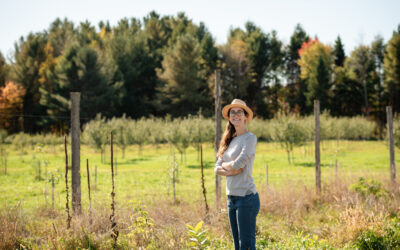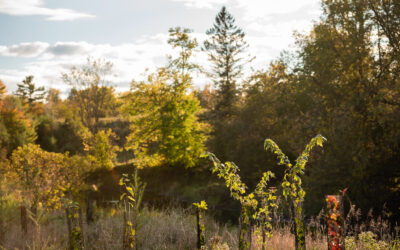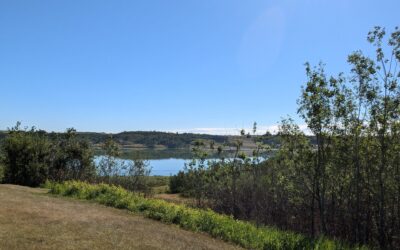Vital role of farmer liaisons highlighted at ALUS workshop funded by OTF

More than 30 of Ontario’s ALUS program coordinators, farmer liaisons and PAC members assembled in Elgin County in July 2019 to learn how farmer liaisons can help advance the ALUS program.
More than 30 of Ontario’s ALUS program coordinators, farmer liaisons and Partnership Advisory Committee (PAC) members assembled in Elgin County on July 31, 2019, to learn more about the vital role played by ALUS farmer liaisons in advancing the ALUS program.
Led by Casey Schelock, ALUS Canada’s Eastern Hub Manager, and funded by the Ontario Trillium Foundation (OTF), the day-long event helped representatives of seven ALUS communities in Ontario learn how farmer liaisons can support and promote local ALUS programs through outreach, project monitoring and site visits.
“I think this event enabled us to give our current and future farmer liaisons the tools they need to support their community programs, and speak confidently about ALUS within their communities,” said Schelock.
ALUS Middlesex PAC member and farmer liaison Mary Simpson, who attended the workshop, agrees. “Events like this help give us the background knowledge and confidence to do our job as farmer liaisons,” says Simpson, “I look forward to more opportunities to learn, especially out in the field.”
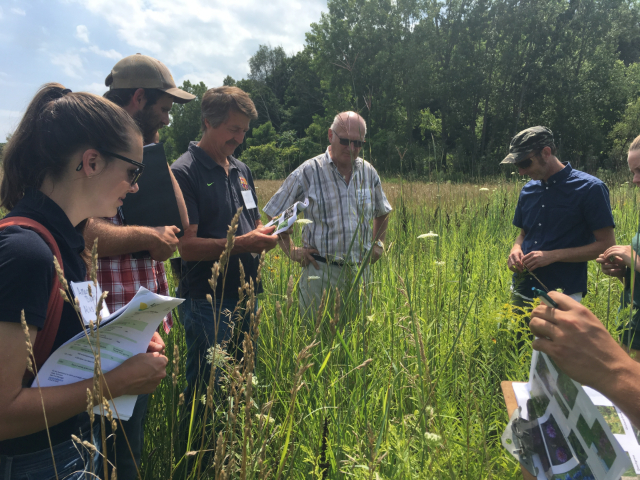
After morning sessions on resources, monitoring, maintenance, outreach and communication, attendees spent the afternoon outdoors at an ALUS project to practice site monitoring in the field.
What is a Farmer Liaison?
ALUS Canada encourages all ALUS communities to engage farmer liaisons, usually selected from among a community’s most outstanding ALUS participants or PAC members who are also farmers or ranchers.
Farmers liaisons provide extension services for the local ALUS program. They conduct outreach within the local farm community by speaking with potential participants and serving as a contact point for existing participants. Farmer liaisons also conduct site monitoring and follow up on ALUS projects to ensure their success.
Because farmer liaisons are farmers themselves, they understand the local farm community and know the landscape and its particular challenges. This enables ALUS farmer liaisons to serve as the embodiment of ALUS’ signature ‘Farmer-to-Farmer’ approach.
“From an operational perspective, farmer liaisons help increase capacity for each ALUS program,” says Casey Schelock. “And from a mission-based perspective, they help us stick to many of our guiding principles—ALUS was founded as a ‘Farmer-Delivered, Community Developed’ program, and we aim to keep it that way.”
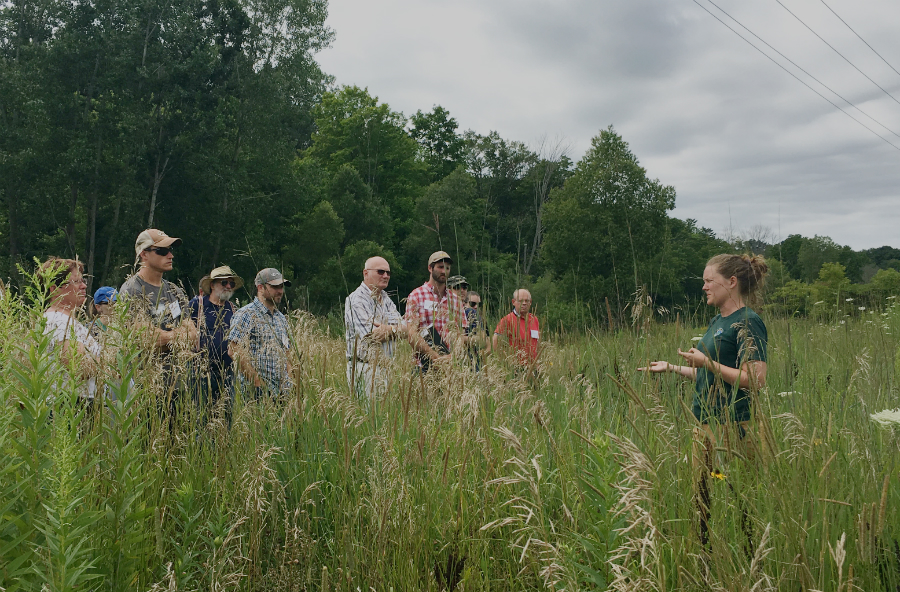
At the training site, ALUS Elgin Program Coordinator Alyssa Cousineau welcomed workshop attendees to ALUS Elgin participant John Webb’s ALUS projects, which include tallgrass prairie, wetland projects and reforested sites.
Field Visit
After morning sessions on resources, monitoring, maintenance, outreach and communication, held in the New Sarum Diner, attendees spent the afternoon outdoors at an ALUS project to practice site monitoring in the field.
ALUS Elgin participant John Webb has a number of ALUS projects, including tallgrass prairie, wetland projects and reforested areas, on his farm in Sparta, Ontario. A a training exercise, workshop participants were asked to identify areas in need of particular kinds of maintenance work.
Daria Koscinski, a Conservation Property Manager at the Thames Talbot Land Trust, who also specializes in ecosystem recovery, conducted a hands-on session on plant identification, teaching attendees the differences between native and non-native plants.
Supported by the Ontario Trillium Foundation
The 2019 Farmer Liaison training workshop was funded by ALUS Canada’s current Ontario Trillium Foundation (OTF) Grow Grant, worth more than $625,000, which aims to help ALUS increase the number of farmers and ranchers undertaking conservation and restoration projects in Ontario. Farmer liaisons can play a key role in achieving this goal.
The OTF has been a generous ALUS supporter for years: From 2015 to 2018, a grant of nearly $700,000 helped ALUS Canada establish four new communities in Ontario (ALUS Lambton, Peterborough, Middlesex and Chatham-Kent, and transform three existing pilot communities into permanent ALUS programs (ALUS Elgin, Grey Bruce and Ontario East).
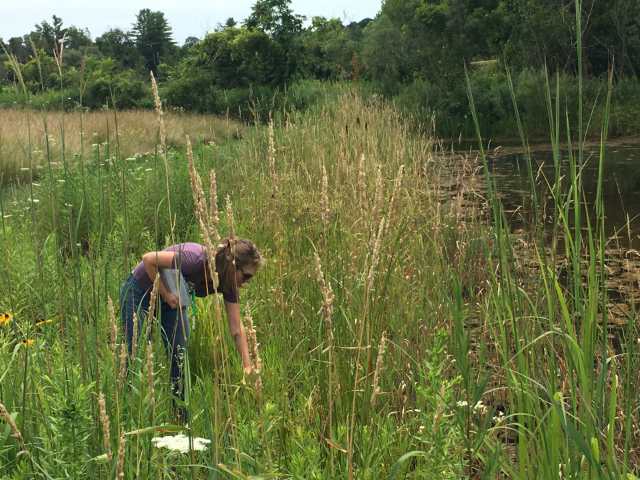
The workshop provided a useful opportunity for attendees, such as ALUS Peterborough Program Coordinator Kate Powell (shown here) to practice ALUS project monitoring techniques in the field.
Success with ALUS Projects
With so many ALUS community members assembled in one place, the workshop was the perfect occasion to launch ALUS Canada’s new series of guidebooks for ALUS project maintenance, also funded by the Ontario Trillium Foundation.
The “Success with ALUS Projects” series presents how to establish and maintain wetland, tree and shrub, grassland and erosion-control projects in ALUS Canada’s Eastern Hub.
ALUS Canada consulted scientific, technical and environmental experts from ALUS PACs, as well as ALUS community program coordinators, for their input on how to properly maintain these types of ALUS projects.
To see a digital version of the guidebooks, visit ALUS.ca’s Resources page, under “Other Relevant Reports.”

